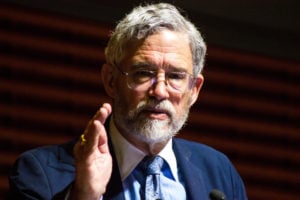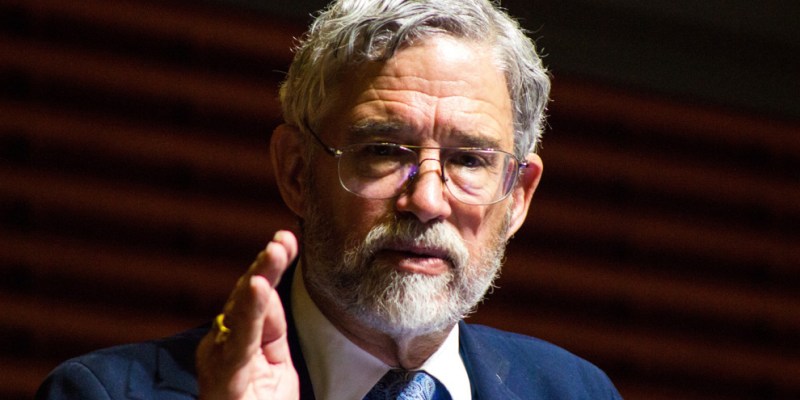
John Holdren Ph.D. ’70, former senior science and technology advisor to former President Barack Obama, delivered the fifth annual Stephen H. Schneider Memorial Lecture on Tuesday evening. Speaking to an audience in CEMEX auditorium, Holdren discussed the elevated role of science policy in the Obama administration and his fears about climate change policy under President Donald Trump.
A Stanford alumnus, Holdren served under Obama as director of the Office of Science and Technology Policy (OSTP). Holdren coordinated interagency cooperation, oversaw NASA and the National Science Foundation (NSF) and served as a co-chair of the President’s Council of Advisors on Science and Technology (PCAST).
His Stanford lecture — titled “Science, Technology, and Environment in the White House: What Did Obama Do? What Will Trump Do?” — began with a video tribute to the late Stephen Schneider. Schneider, a respected climatologist, was an advocate for action to combat climate change. He was also a prominent member of Stanford faculty and consulted for multiple White House administrations.
Next, Holdren discussed the Obama administration’s role in expanding the voice of science in government. Using Obama’s pledge to “restore science to its rightful place” as a framework, Holdren described steps taken during both of Obama’s terms to strengthen the role of science policy in the federal government.
The lecture also highlighted the Obama administration’s achievements regarding the advancement of climate-related science and technology. Holdren was especially proud of cooperation secured on the international level and pointed to treaties such as the Paris Agreement on climate change, which went into effect in 2016.
In an interview with The Daily, Holdren again emphasized this pride for his work.
“We made big strides in support for clean energy, in support for increased energy efficiency, … climate change preparedness … [and] an enormous drive [against] climate change in the international arena,” he said.
Holdren was more reserved about the current state of climate affairs, however. Pointing to impacts of climate change such as fires, droughts and floods, he said the state of the world is “way past dangerous today.”
“The question now is, can we avoid catastrophic?” he said.
Of particular concern for Holdren is the general role of climate policy and science in the current presidential administration. Pointing to proposed budget increases for the military and cuts to the State Department, Holdren said, “This is nuts.”
Holdren encouraged scientists to continue their research, while urging other concerned citizens to pay close attention to and protest dangerous climate policies.
Following his talk, Holdren participated in a Twitter Q&A session, answering questions on topics ranging from habitat destruction to the role of activism in science policy. He specifically addressed the advantages and disadvantages of the upcoming March for Science, a Washington, D.C.-based march for scientists, science enthusiasts and citizens to voice their concerns about science policy.
The lecture event itself was founded by Schneider’s wife, Woods Institute Senior Fellow Terry Root, to carry on Schneider’s vision and voice. Root’s hope is that these lectures, which began in 2013 with former Vice President Al Gore, can expose students to people and ideas that they typically would not be exposed to in order to expand their knowledge of the world.
“We had to explain the science to people so that they would understand what the overall problem is,” Root said. “It doesn’t help for scientists to understand it if the general public doesn’t understand that there’s a problem.”
To ensure that the baton of scientific knowledge is passed on, the annual lectures are completely student-run. This year, Stanford seniors Meghan Shea ’17 and Ashley Jowell ’17 took the reins.
Despite her fears about the Trump administration, Shea shares Schneider’s philosophy of an educated and motivated public.
“It gives me a lot of hope that we will be able to mobilize people and citizens to start taking action on their own,” Shea said.
While they expressed concern for the future of climate policy, Holdren and Root both agreed with Shea’s sentiment, putting their confidence in the strength of individual action.
“You have voices that can be as loud as anybody,” Holdren told the students in his audience. “You are articulate, smart and effective. You represent the future.”
Contact Matt Nissen at mnissen ‘at’ stanford.edu.
